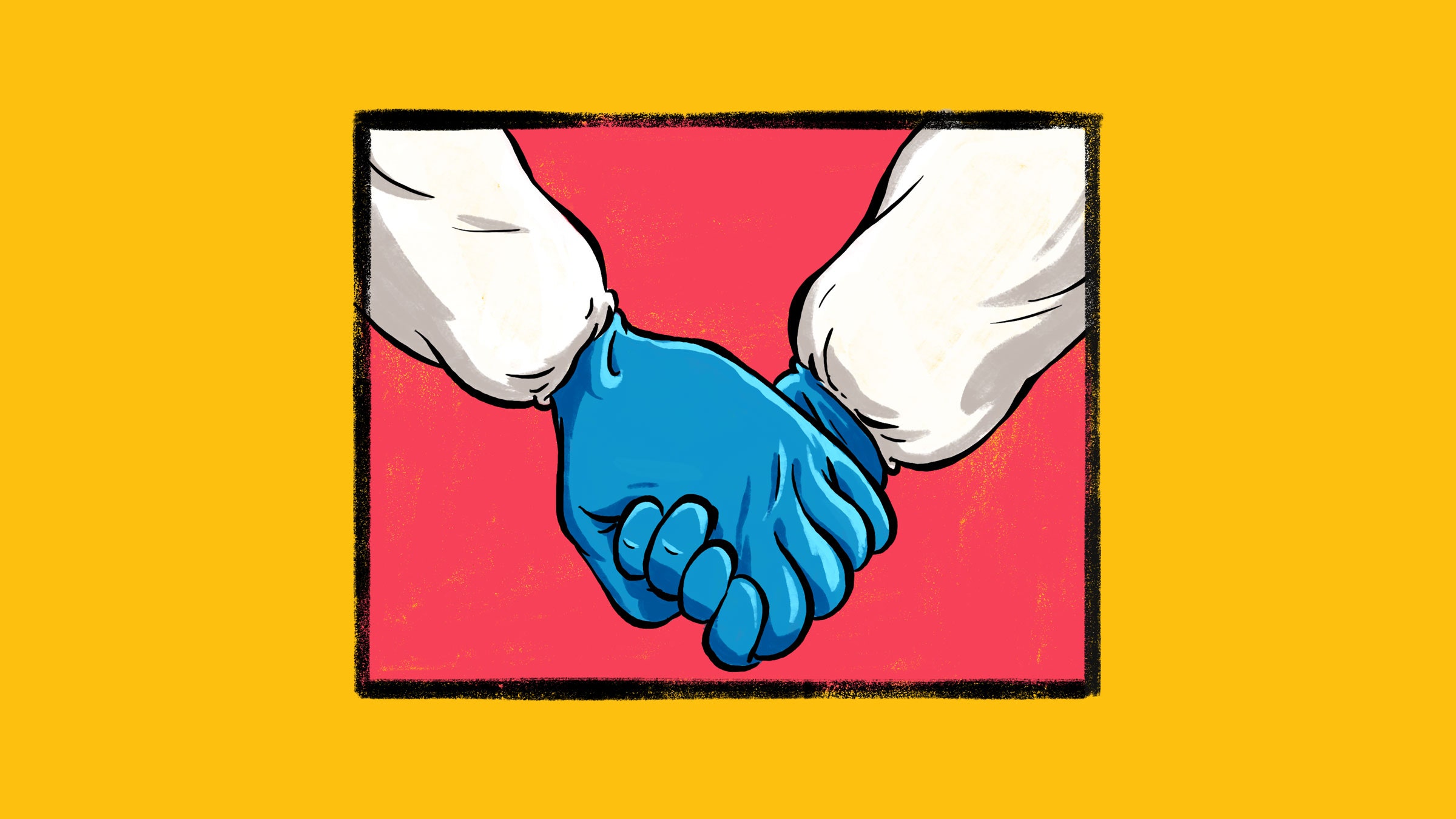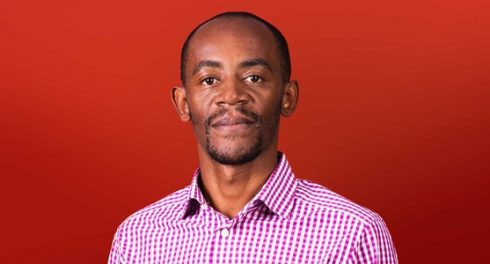Highlight:
- “To be trusted is a greater compliment than being loved”
- Overdue reflection
- The art of the (dodgy) deal
- Latent but impotent?
- Hips (and paper trails) don’t lie
- Acronym wars
- Bringing accountability to the COVID-19 recovery
“To be trusted is a greater compliment than being loved”

Illustration by Zohar Lazar via Wired
Pandemic impacts to the fore this week. A World Bank paper highlights how trust in government may support a sense of social connection, thus bringing about an effective collective action response to the crisis. But keeping such trust is not always easy. In Nigeria, a USIP study finds victims of violence are less trusting of public health measures taken by the government even amid a pandemic. A survey by the Social Resilience Lab of Nanyang Technological University reveals that government officials are the third most trusted source of information on COVID-19 in Indonesia (after medical staff and religious leaders). Not so bad, but as professor Sulfikar Amir notes, “the problem is the message from the government is not always accurate.” That leaves civil society trying to bridge COVID-19 information gap.
Kathryn Taetzsch and Sue Cant from World Vision International argue for integrating citizen feedback to assure government and donor social protection programs reach the most vulnerable in the context of COVID-19. Learn how SEND Ghana is coordinating CSOs’ efforts to support vulnerable groups and communities’ demands, while tracking government’s responses and facilitating real-time feedback.
For citizens, getting reliable information is harder if the media faces growing restrictions. A new report notes three concerning trends for journalists in Latin America: greater pressure and threats towards journalists themselves; limits on access to information; mis-and disinformation increasing, sometimes advanced by public officials.
Overdue reflection

CSOs worldwide are experiencing extensive effects of the pandemic, including loss of funding and major structural changes, but also further revealing longstanding divides. Transparency International Zambia’s Maurice K. Nayambe shares some sobering lessons as Jon Harle questions the inequity within knowledge systems, and Leda Kamenopoulou urges us to decolonize research and place southern voices at the forefront.
Jonathan Fox advocates for countervailing power for the excluded to improve accountability. Discover how Integrity Action addressed power imbalances with their local partners in Kenya while ensuring community safety.
Abeba Birhane discusses how western technology is implemented in the African continent with little regulation or analysis of the politics and values it espouses. On a practical level, inequities in access to technology have knock-on effects for information and, increasingly, public services. Teddy Woodhouse highlights the gap and urges government, multilateral bodies, and civil society to work together to make the internet more accessible for billions by reducing smartphone costs.
The art of the (dodgy) deal

Image via cgdev
Accurate information is a bedrock not just for health responses but also assuring effective use of relief funds. The big sums involved are a target for fraud in the US and beyond. The Open Contracting Partnership and Spend Network document $130bn (£97bn) in government spending on pandemic-related contracts, and George Monbiot highlights the dangers of the proportion awarded without a competitive process. South Africa has now published the full list of companies that won coronavirus-related government contracts, but Auditor-General Kimi Makwetu flags overpricing and potential fraud around the purchase of PPE and access to relief funds. Reports point to tenders being farmed out to the families and friends of the well connected.
Unemployed Kenyans and Catholic bishops are already questioning and condemning the misuse of COVID-funds in their country while an ICIR investigation reveals infrared thermometers were purchased at drastically inflated prices in Nigeria. Fingers crossed for more Nigerian vigilance to come as Spotlight for Transparency and Accountability train a new generation on citizen-led tracking.
Latent but impotent?
Not that we should assume that transparency automatically build citizen faith in proceedings – could it prime skepticism instead? A new study finds awareness of access to government information – what the authors term latent transparency – tends to be unrelated – or slightly negatively related – to trust of government agencies.
What of information availability to promote efficiency? Don’t miss this data-disclosure success story of how CoST approach promoted behavioral change from the private sector, community, and government and led to cost savings of US $360 million in government contracts in Thailand. Pair with lessons to help advance gender-inclusive infrastructure.
From one multistakeholder initiative to another. The Extractive Industries Transparency Initiative long avoided a formal theory of change. Now, Philippe Le Billon, Päivi Lujala, and Siri Aas Rustad offer three potential pathways: ‘naming and shaming’ to diminish revenue loss; public debate and demand; and technical reforms to build civil society capacity. Given the challenge of reconciling a consensus model with name and shame, no surprise they urge most focus on the public debate role.
Worried about “impact washing”? Rocío Trujillo Sosa highlights an accountability gap in impact investing. while ImpactAlpha cover worries over UNDP endorsing private equity and bond issuers as SDG “certified.”
As safeguards on corporate accountability, the Uganda government is in the final stages of developing an oil spills contingency plan that would hold companies liable for cleaning up oil spills and compensating affected communities, while mining giant ArcelorMittal launches an $840k development fund for beneficiary communities in Liberia (just fourteen years into operations in the country.)
Hips (and paper trails) don’t lie

Wonder how the rich and famous go about avoiding taxes? Read the tale of Inspector Susana C. in Spain who resolutely unpacked singer Shakira’s business empire and cornered her for tax evasion to the tune of €14.5 million.
Outgoing Oxfam tax campaigner, Oliver Pearce reflects on global and national progress on tax reform in the last five years and calls for efforts to move beyond corporate tax to collective action around climate change, inequality, and strengthening the social contract in a post-pandemic world. Meanwhile, Elie Kabue Ngindu and Jonathan Weigel share evidence from a policy experiment on property taxation and how it leads to citizen engagement and accountability in the DRC.
Acronym wars
FACTA vs. GDPR. What happens when personal data rights risk conflicting with efforts to clamp down on tax avoidance? TAI members support both fronts, so worth watching ongoing court fights with interest.
Last week we featured how the G20 could do more to fight corruption. This week we turn to the first UN General Assembly Special Session against Corruption to take place next year; Mats Benestad argues it can be a game-changer if it prioritizes the threat of grand corruption.
What’s the best way to tackle foreign lobbying in the US (with an election looming)? Casey Michel and Ben Freeman argue for a collection of targeted laws and policies instead of a ban that could lead to problems both at home and abroad. What of corporate self-policing? Tyler McBrien details the experience of implementing the first international anti-bribery management system standard ISO 37001
Finally, the Paris Peace Forum is still hoping to be one of the first in-person major gatherings in the COVID-age. It has shortlisted 100 projects to be presented at the Nov 2020 Forum. The list features interventions to support response and recovery from COVID-19 pandemic and about half of the projects would be implemented in multiple countries, if not globally. See which ones grab your attention!
TAI SPOTLIGHT: Bringing accountability to the COVID-19 recovery
Learning from the past: Bringing accountability to the COVID-19 recovery | Transparency and Accountability Initiative
Through flattening curves, eyeballing six-foot distances, and brushing up on vaccine trial standards, the pandemic has made amateur statisticians out of all of us. TAI summer fellow, Brian Potochney writes on the importance of data transparency – particularly when the health crisis wanes and the economic fallout drags on.
Carbon accounting should be a basic requirement for banks | Hewlett Foundation
Hewlett Foundation’s Environment Program Officer, Marilyn Waite, says carbon accounting should be a basic requirement for banks to measure and disclose the carbon emissions of their financial portfolios.
The Legacy of Black Giving | Ford Foundation
In honor of Black Philanthropy Month, Ford Foundation’s Nicole Eley-Carr and Nicole Okai spoke with Valaida Fullwood, co-architect of Black Philanthropy Month, and Linetta Gilbert, a former senior program officer at Ford, who has invested over $1 billion in her philanthropic career into community-led philanthropic organizations.
A sign for human rights in Kyrgyzstan | Open Society Foundations
Open Society Foundations’ Youth Action Fund coordinator, Lira Momunalieva, reveals how the fund is raising the profile of human rights in Kyrgyzstan and how such investment can lead to big, positive results.
New institutional home for Membership Puzzle Project and launch of Membership in News Fund announced | Luminate
Luminate, Media Development Investment Fund, and the team of Membership Puzzle Project (MPP) announced a new $400,000 Membership in News Fund to support innovative work in the use of membership models in public service journalism. The Fund will provide grants and know-how to independent media seeking to implement membership models in countries in Eastern Europe, Asia, Africa, and Latin America.
Job listings
- Luminate Director, Africa – Ongoing
- Communications officer at ICTD – Ongoing
- Job postings at Ford Foundation – Ongoing
- Job postings at Democracy fund – Ongoing
- Job postings at Wikimedia Foundation – Ongoing (and mostly remote)
- Government Affairs Senior Policy Advisor, International Financial Institutions at Oxfam – Ongoing
- Director of Development and Solidarity Philanthropy at Grassroots International – Ongoing
- Senior Communications Coordinator at Grassroots International – Ongoing
Calls/Opportunities
- BetterTogether Challenge for innovators – Ongoing
- Call for research proposals: Tax and civil society [No Deadline]
- Free Digital Security Training – Ongoing
- Open Road Alliance Charitable Grant and Loan to organizations responding directly to COVID-19 – Ongoing
- Call for submissions to SSIR Series: Social change in an era of extreme polarization – Last Thursday of every month until early 2021
- Pulitzer Center Coronavirus news collaboration challenge – Applications will be reviewed on a first-come, rolling basis
- Call for proposals: Informality, tax, and the state – Proposals accepted on a rolling basis
- Building a Just Recovery: Workers’ views on the post-pandemic economy – September 16, 2020 (11:30 am -1:00 pm ET)
- Evaluation consultant for Joseph Rowntree Charitable Trust’s Power and Accountability programme – September 28, 2020 (9am)
- Citizen-Led Accountability: Strategies and Tools Certificate course – October 1, 2020
Calendar
- A digital dilemma: How to ensure accountability and inclusion in the time of COVID-19 – September 9 , 2020 (13: 00 BST)
- UN Global Governance Forum – September 16-17, 2020
- WE EMpower UN SDG Challenge 2020 – September 18 – 27, 2020 (New York City, United States of America)
Nonprofit Management Institute 2020, COVID-19: Reshaping social innovation – September 22-24, 2020 - Corporate Anti-Corruption Compliance Drivers, Mechanisms, and Ideas for Change –September 23, 2020 (15:00, Paris time)
- The 2020 Journalism Funders Gathering (funder-only gathering) – October 6-7, 2020 (Philadelphia, United States of America)
Humanitarian and Development Data Forum – November 2-4, 2020 (Chambery, France) - World Forum for Democracy (democracy and the environment) – November 16-18, 2020 (Strasbourg, France)
- Transparency International: 19th International Anti-Corruption Conference – (Postponed)
International Open Data Conference –(Postponed till 2021)


